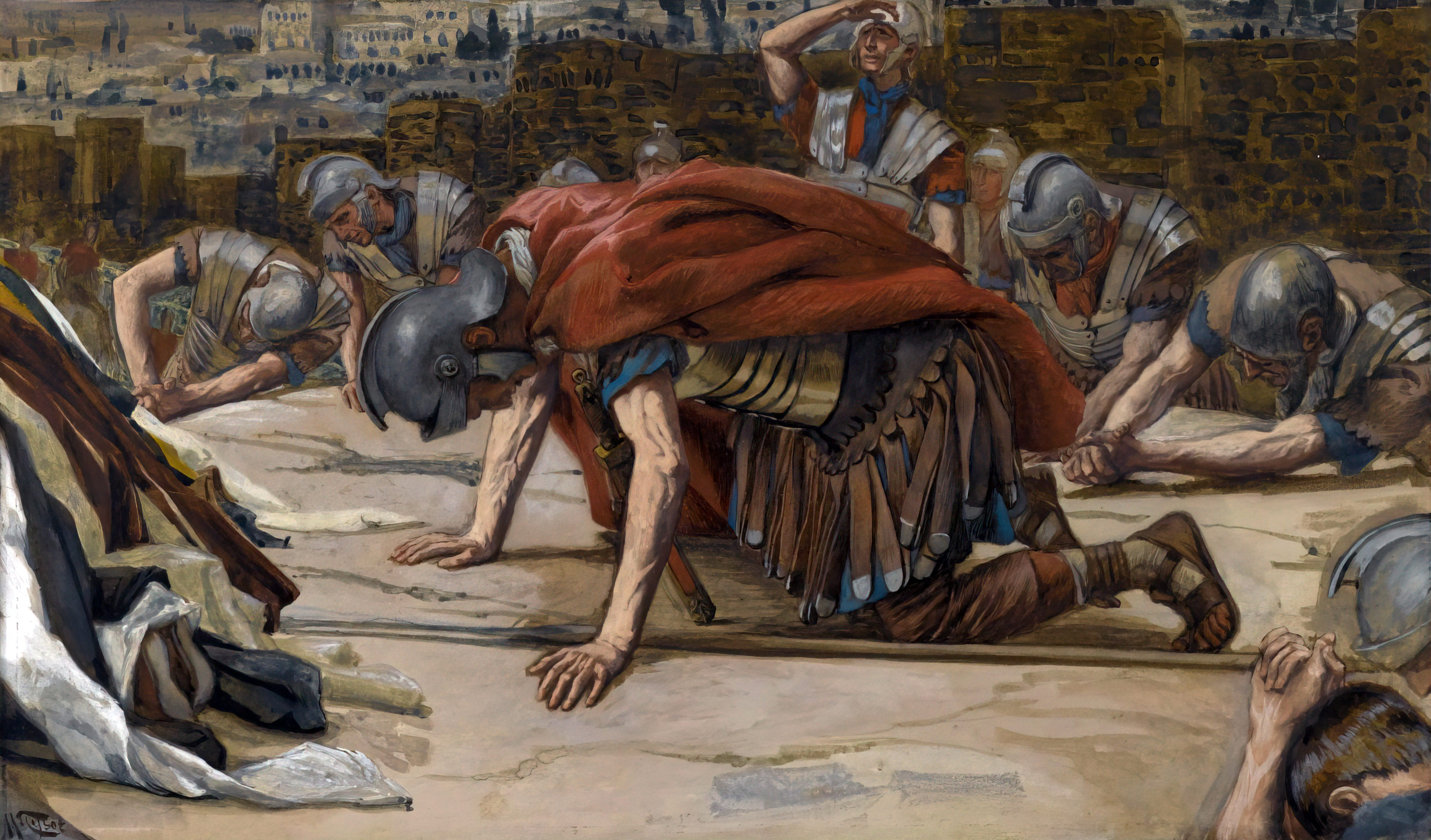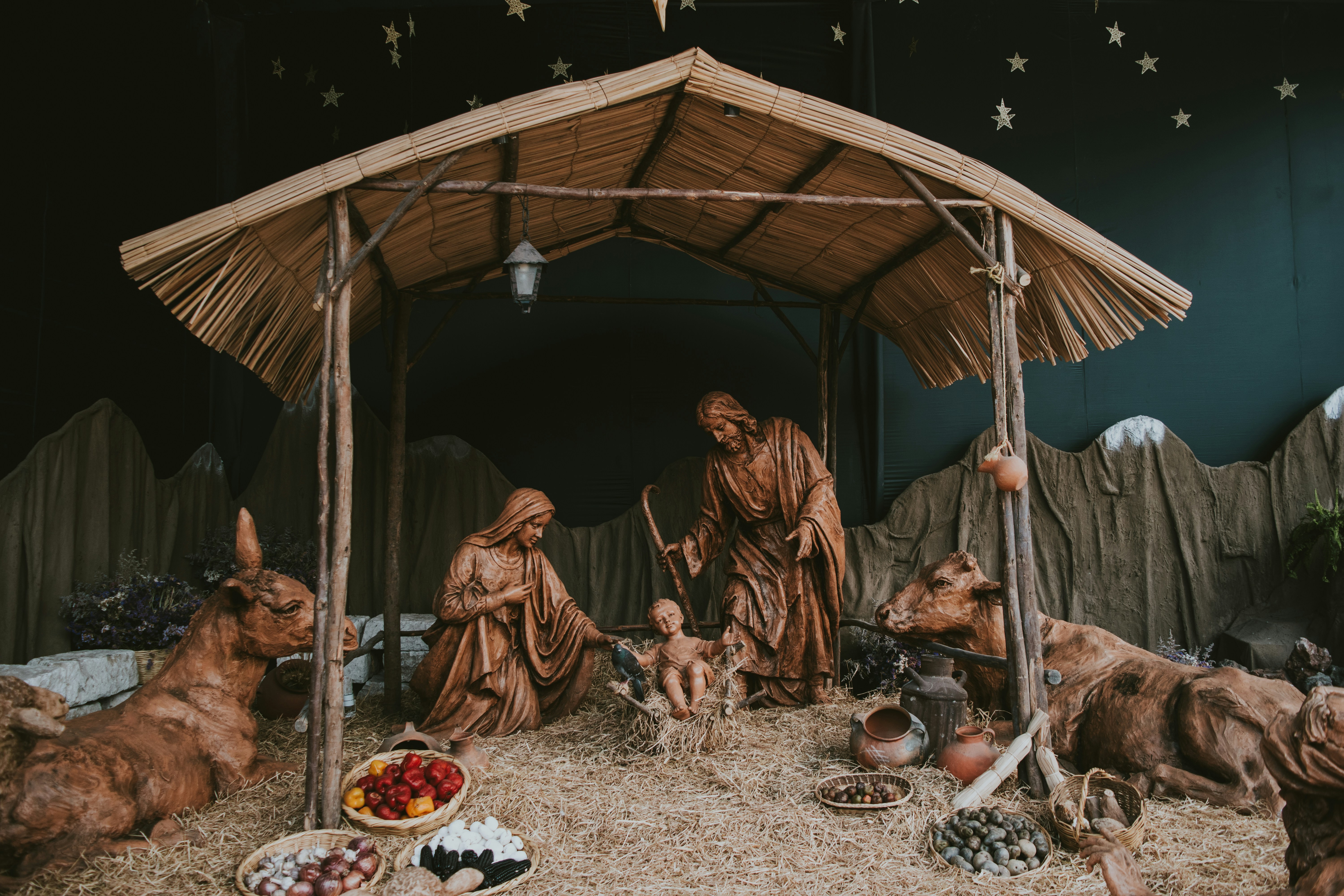As I was reading today’s readings, I was struck by the frequency of the word “Lord.” In the first reading, the Jews sing a song about God’s fidelity in keeping them in peace. They trust in the Lord, and He keeps them safe: “Trust in the Lord forever! For the Lord is an eternal Rock. He humbles those in high places, and the lofty city he brings down” (Isa 26:4–5). The psalm focuses on giving thanks to the Lord and taking refuge in Him, recognizing that He has opened His gates to the just, bringing salvation, prosperity, and light to the faithful. In the Gospel, Jesus emphasizes the security of those who hear the words of the Lord and act on them, not simply saying, “Lord, Lord.”
In the first reading, it is the Lord who does everything: He keeps the people in peace, He humbles those in high places, He brings down the lofty city, and He opens the gates to let in a just nation. In the psalm, the speaker takes refuge in the Lord rather than any other authority, and recognizes that it is God alone who saves, gives prosperity, and provides light. The speaker cannot even attribute the “gates of justice” to man: “This gate is the Lord’s” (Ps 118:20).
The common thread here, besides the word “Lord,” is the exalted status of God. Of course we should put God first. But the sacred authors, instructed by Revelation, recognize that this means that we ought to follow Him without reservation, attributing the efficacy of all our endeavors to His grace. The Lord is the one doing all of the work, and we follow by trusting in Him and relying on Him. Jesus carries this theme to its conclusion, pointing out that if we rely solely on our own intelligence, we will have a shaky foundation. If we rely on God’s word, we will have a firm foundation.
To have a firm foundation, prosperity, light, salvation, and all the rest, we have to put our trust in the Lord and follow Him. This means that we should both hear and do His word, even when it is difficult for us. This is not self-annihilation, even though the path to discipleship begins with a great deal of self-denial. Jesus contrasts the man who built his house based on his own intelligence with the man who built his house using God’s word as the foundation, but in the end our own desires should come into conformity with God’s will. St. Augustine’s famous line “Love God and do what you will” expresses this union. The one who loves God completely, trusting in Him and following Him in all circumstances, will soon find that his only desire is to do what God thinks is best. If we focus on God first, recognizing that He is to thank for everything, and remain in a state of grace, we can trust that our desires will be aligned with His.
Mientras leía las lecturas de hoy, me llamó la atención la frecuencia de la palabra “Señor”. En la primera lectura, los judíos cantan un canto sobre la fidelidad de Dios al mantenerlos en paz. Confían en el Señor y Él los mantiene a salvo: “Confíen siempre en el Señor, porque el Señor es nuestra fortaleza para siempre; porque él doblegó a los que habitaban en la altura; a la ciudad excelsa la humilló” (Isaías 26,4-5). El salmo se centra en dar gracias al Señor y refugiarse en Él, reconociendo que ha abierto sus puertas a los justos, trayendo salvación, prosperidad y luz a los fieles. En el Evangelio, Jesús enfatiza la seguridad de aquellos que escuchan las palabras del Señor y las ponen en práctica, no simplemente diciendo: “Señor, Señor”.
En la primera lectura, es el Señor quien hace todo: mantiene al pueblo en paz, humilla a los que están en las alturas, derriba a la ciudad enaltecida y abre las puertas para dejar entrar a una nación justa. En el salmo, el orador se refugia en el Señor antes que en cualquier otra autoridad, y reconoce que es solo Dios quien salva, da prosperidad y provee luz. El orador ni siquiera puede atribuir al hombre las “puertas del templo”: “Ésta es la puerta del Señor” (Sal 118,20).
El tema en común, además de la palabra “Señor”, es el estatus exaltado de Dios. Por supuesto que debemos poner a Dios en primer lugar. Pero los autores sagrados, instruidos por la revelación de Dios, reconocen que esto significa que debemos seguirlo sin reservas, atribuyendo la eficacia de todos nuestros esfuerzos a su gracia. El Señor es quien hace todo el trabajo, y nosotros lo seguimos confiando en Él y apoyándonos en Él. Jesús lleva este tema hasta su conclusión, señalando que si nos basamos únicamente en nuestra propia inteligencia, tendremos un fundamento inestable. Si nos basamos en la palabra de Dios, tendremos un fundamento firme.
Para tener un fundamento firme, prosperidad, luz, salvación y todo lo demás, tenemos que poner nuestra confianza en el Señor y seguirlo. Esto significa que debemos escuchar y hacer su palabra, incluso cuando nos resulte difícil. Esto no es autoaniquilación, aunque el camino hacia el discipulado comienza con una gran dosis de abnegación. Jesús contrasta al hombre que construyó su casa basándose en su propia inteligencia con el hombre que construyó su casa usando la palabra de Dios como fundamento, pero al final nuestros propios deseos deben estar en conformidad con la voluntad de Dios. La famosa frase de San Agustín “Ama a Dios y haz lo que quieras” expresa esta unión. El que ama a Dios completamente, confiando en Él y siguiéndolo en todas las circunstancias, pronto encontrará que su único deseo es hacer lo que Dios piensa que es mejor. Si nos centramos en Dios primero, reconociendo que es a Él a quien debemos agradecer por todo, y permanecemos en un estado de gracia, podemos confiar en que nuestros deseos estarán alineados con los suyos.
 David Dashiell is a freelance author and editor in the Nashville, Tennessee area. He has three children, a degree in theology, and enjoys writing about philosophy, theology, culture, music, and comedy. You can find his personal blog, Serious Daydreams, on Substack. He is also the editor of the anthology Ever Ancient, Ever New: Why Younger Generations Are Embracing Traditional Catholicism, available through TAN Books.
David Dashiell is a freelance author and editor in the Nashville, Tennessee area. He has three children, a degree in theology, and enjoys writing about philosophy, theology, culture, music, and comedy. You can find his personal blog, Serious Daydreams, on Substack. He is also the editor of the anthology Ever Ancient, Ever New: Why Younger Generations Are Embracing Traditional Catholicism, available through TAN Books.
Feature Image Credit: Anton Dorph, art.diocesan.com/stock-photo/the-walk-to-emmaus-20055/


 Kathryn Mulderink, MA, is married to Robert, Station Manager for Holy Family Radio. Together they have seven children (including Father Rob), and eleven grandchildren. She is President of the local community of Secular Discalced Carmelites and has published five books and many articles. Over the last 30 years, she has worked as a teacher, headmistress, catechist, Pastoral Associate, and DRE, and as a writer and voice talent for Catholic Radio. Currently, she serves the Church by writing and speaking, and by collaborating with various parishes and to lead others to encounter Christ and engage their faith. Her website is
Kathryn Mulderink, MA, is married to Robert, Station Manager for Holy Family Radio. Together they have seven children (including Father Rob), and eleven grandchildren. She is President of the local community of Secular Discalced Carmelites and has published five books and many articles. Over the last 30 years, she has worked as a teacher, headmistress, catechist, Pastoral Associate, and DRE, and as a writer and voice talent for Catholic Radio. Currently, she serves the Church by writing and speaking, and by collaborating with various parishes and to lead others to encounter Christ and engage their faith. Her website is 
 Hailing from Nashville, Catherine is a graduate of Christendom College with a lifelong passion for words. Her love of writing and her Catholic Faith continue to shape her as a freelance editor, copywriter, and (aspiring) novelist, where she pursues her passions for the love and greater glory of God.
Hailing from Nashville, Catherine is a graduate of Christendom College with a lifelong passion for words. Her love of writing and her Catholic Faith continue to shape her as a freelance editor, copywriter, and (aspiring) novelist, where she pursues her passions for the love and greater glory of God.



 Tami Urcia grew up in Western Michigan, a middle child in a large Catholic family. She spent early young adulthood as a missionary in Mexico, studying theology and philosophy, then worked and traveled extensively before finishing her Bachelor’s Degree in Western Kentucky. She loves tackling projects, finding fun ways to keep her little ones occupied, quiet conversation with the hubby and finding unique ways to love. She works full time at Diocesan, is a guest blogger on
Tami Urcia grew up in Western Michigan, a middle child in a large Catholic family. She spent early young adulthood as a missionary in Mexico, studying theology and philosophy, then worked and traveled extensively before finishing her Bachelor’s Degree in Western Kentucky. She loves tackling projects, finding fun ways to keep her little ones occupied, quiet conversation with the hubby and finding unique ways to love. She works full time at Diocesan, is a guest blogger on 
 A lover of Jesus Christ, a wife, and a mother of five,
A lover of Jesus Christ, a wife, and a mother of five, 
 Deacon Dan Schneider is a retired general manager of industrial distributors. He and his wife Vicki have been married for over 50 years. They are the parents of eight children and thirty-one grandchildren. He has a degree in Family Life Education from Spring Arbor University. He was ordained a Permanent Deacon in 2002. He has a passion for working with engaged and married couples and his main ministry has been preparing couples for marriage.
Deacon Dan Schneider is a retired general manager of industrial distributors. He and his wife Vicki have been married for over 50 years. They are the parents of eight children and thirty-one grandchildren. He has a degree in Family Life Education from Spring Arbor University. He was ordained a Permanent Deacon in 2002. He has a passion for working with engaged and married couples and his main ministry has been preparing couples for marriage.

 Merridith Frediani loves words and is delighted by good sentences. She also loves Lake Michigan, dahlias, the first sip of hot coffee in the morning, millennials, and playing Sheepshead with her husband and three kids. She writes for Catholic Mom, Diocesan.com, and her local Catholic Herald. Her first book Draw Close to Jesus: A Woman’s Guide to Adoration is available at Our Sunday Visitor and Amazon. You can learn more at
Merridith Frediani loves words and is delighted by good sentences. She also loves Lake Michigan, dahlias, the first sip of hot coffee in the morning, millennials, and playing Sheepshead with her husband and three kids. She writes for Catholic Mom, Diocesan.com, and her local Catholic Herald. Her first book Draw Close to Jesus: A Woman’s Guide to Adoration is available at Our Sunday Visitor and Amazon. You can learn more at 
 Kate Taliaferro is an Air Force wife and mother. She is blessed to be able to homeschool, bake bread and fold endless piles of laundry. When not planning a school day, writing a blog post or cooking pasta, Kate can be found curled up with a book or working with some kind of fiber craft. Kate blogs at
Kate Taliaferro is an Air Force wife and mother. She is blessed to be able to homeschool, bake bread and fold endless piles of laundry. When not planning a school day, writing a blog post or cooking pasta, Kate can be found curled up with a book or working with some kind of fiber craft. Kate blogs at 
